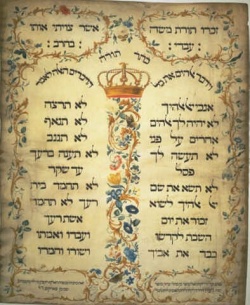Honour: Difference between revisions
(Created page with "Exodus 20:12 Honour thy father and thy mother: that thy days may be long upon the land which the LORD thy God giveth thee. Deuteronomy 5:16 Honour thy father and thy mother...") |
No edit summary |
||
| Line 1: | Line 1: | ||
[[File:10.jpg|thumb|250px|Decalogue parchment by Jekuthiel Sofer 1768. We see the '''[[Ten Commandments]]''' listed off in the Old Testament but repeated by Christ in the New.]] | |||
Exodus 20:12 Honour thy father and thy mother: that thy days may be long upon the land which the LORD thy God giveth thee. | Exodus 20:12 Honour thy father and thy mother: that thy days may be long upon the land which the LORD thy God giveth thee. | ||
Revision as of 22:33, 15 March 2020

Exodus 20:12 Honour thy father and thy mother: that thy days may be long upon the land which the LORD thy God giveth thee.
Deuteronomy 5:16 Honour thy father and thy mother, as the LORD thy God hath commanded thee; that thy days may be prolonged, and that it may go well with thee, in the land which the LORD thy God giveth thee.
The word "honour" in these two verses is from the Hebrew word "kabad".[1] As a root word, it includes the letters KufBeitLamed ^דבכ^ and can mean to honor in the sense of make heavy or fatten, promote or even prosper. The first place we see the word "kabad" in this root form is in Genesis 13:2[2] where it is translated "rich".
In the New Testament we see the word timao[3] repeated seven times[4] concerning the word translated honor in relationship to your parents. The word actually has the meaning of something valued or given value.
The word certainly is not talking about simply obeying your parents or doing what they say but has to do with caring for them and providing for them whenever they are in need.
The Pharisees often used their system of welfare to care for their parents saying the sacrifice they made to the temple should provide for them. Jesus said the system of forced sacrifice set up by them through Herod called Corban was making the word of God to none effect because the people did no more ought for their parents.
The Social Security system today often produces the same results because in principle it is identical to the Corban of the Pharisees. When FDR set up that system he and the people were openly violating several of the Ten Commandments in Exodus 20 and the warnings of Christ and the Apostles and are now in need of repentance.
Keep the Commandments |
Ten Commandments |
The Ten Laws |
Two commandments |
Commanded |
Eternal life |
Grace |
Doer |
Not inherit the kingdom |
Modern Christians |
Christians check list |
If you need help:
- Or want to help others:
Join The Living Network of The Companies of Ten
The Living Network |
Join Local group |
About |
Purpose |
Guidelines |
Network Removal
Contact Minister |
Fractal Network |
Audacity of Hope |
Network Links
Footnotes
- ↑ 03513 ^דבכ^ kabad \@kaw-bad’\@ or ^דבכ^ kabed \@kaw-bade’\@ KufBeitDalet a primitive root; v; {See TWOT on 943} AV-honour 34, glorify 14, honourable 14, heavy 13, harden 7, glorious 5, sore 3, made heavy 3, chargeable 2, great 2, many 2, heavier 2, promote 2, misc 10; 116
- 1) to be heavy, be weighty, be grievous, be hard, be rich, be honourable, be glorious, be burdensome, be honoured
- 1a) (Qal)
- 1a1) to be heavy
- 1a2) to be heavy, be insensible, be dull
- 1a3) to be honoured
- 1b) (Niphal)
- 1b1) to be made heavy, be honoured, enjoy honour, be made abundant
- 1b2) to get oneself glory or honour, gain glory
- 1c) (Piel)
- 1c1) to make heavy, make dull, make insensible
- 1c2) to make honourable, honour, glorify
- 1d) (Pual) to be made honourable, be honoured
- 1e) (Hiphil)
- 1e1) to make heavy
- 1e2) to make heavy, make dull, make unresponsive
- 1e3) to cause to be honoured
- 1f) (Hithpael)
- 1f1) to make oneself heavy, make oneself dense, make oneself numerous
- 1f2) to honour oneself
- 1a) (Qal)
- 1) to be heavy, be weighty, be grievous, be hard, be rich, be honourable, be glorious, be burdensome, be honoured
- ↑ Genesis 13:2 And Abram [was] very rich in cattle, in silver, and in gold.
- ↑ 5091 ~τιμάω~ timao \@tim-ah’-o\@ from 5093 timios meaning something precious and valuable; TDNT-8:169,1181; {See TDNT 792} v AV-honour 19, value 2; 21
- 1) to estimate, fix the value
- 1a) for the value of something belonging to one’s self
- 2) to honour, to have in honour, to revere, venerate
- 1) to estimate, fix the value
- ↑ Matthew 15:4 For God commanded, saying, Honour thy father and mother: and, He that curseth father or mother, let him die the death.
- Matthew 15:6 And honour not his father or his mother, he shall be free. Thus have ye made the commandment of God of none effect by your tradition.
- Matthew 19:19 Honour thy father and thy mother: and, Thou shalt love thy neighbour as thyself.
- Mark 7:10 For Moses said, Honour thy father and thy mother; and, Whoso curseth father or mother, let him die the death:
- Mark 10:19 Thou knowest the commandments, Do not commit adultery, Do not kill, Do not steal, Do not bear false witness, Defraud not, Honour thy father and mother.
- Luke 18:20 Thou knowest the commandments, Do not commit adultery, Do not kill, Do not steal, Do not bear false witness, Honour thy father and thy mother.
- Ephesians 6:2 Honour thy father and mother; (which is the first commandment with promise;)